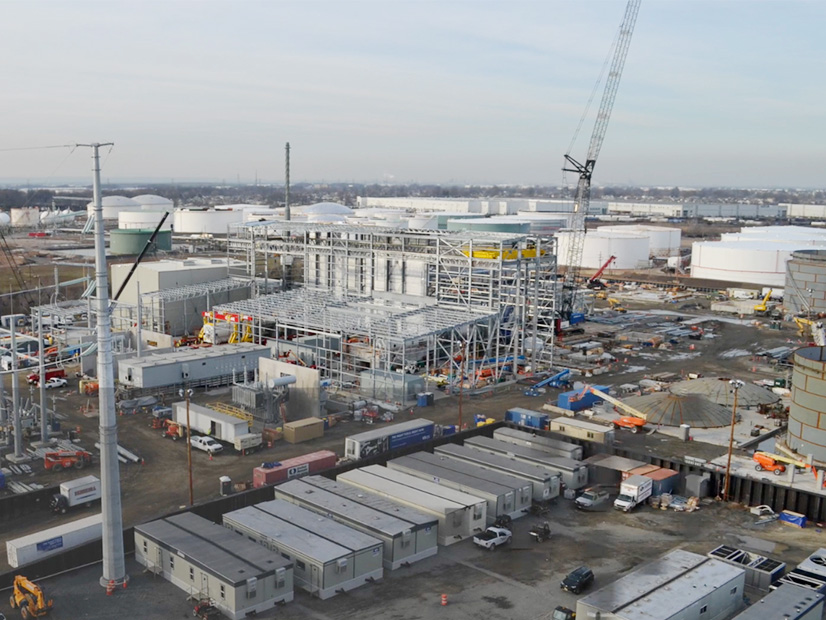A coalition of about 120 environmental, community, faith and grassroots groups have filed suit against the New Jersey Department of Environmental Protection (DEP), seeking to force the agency to enact measures that the coalition argues would cut greenhouse gas emissions in the state 50% below 2005 levels by 2030.
Filed in the state Appellate Division of Superior Court on Thursday, the EmpowerNJ suit seeks to overturn the DEP’s Dec. 14 rejection of a petition the coalition filed in July. The petition demanded that the state accelerate its timeline for reducing greenhouse gas emissions and immediately stop issuing permits for fossil fuel projects, including pipelines and power plants that use natural gas. (See NJ Enviros Squeeze Governor on GHG Goals.)
EmpowerNJ’s submission to the court said that the denial should be overturned because the DEP failed to comply with the state’s Global Warming Response Act, legislation enacted in 2007 that required the state to achieve certain emissions reduction goals.
The setting of “interim greenhouse gas reduction benchmarks” under the law is “mandatory … not discretionary” the coalition’s suit says. It adds that the DEP’s failure to establish benchmarks was an “abuse of discretion” and the decision to deny the coalition’s petition was “arbitrary and capricious” and conflicted with state policy.
“Anything less than 50×30 would be too little and too late, so we’re taking DEP to court,” said John Reichman of BlueWaveNJ, a citizen lobbying group, in a statement, using the shorthand term for reaching a 50% cut in emissions by 2030.
Demanding Action
With Gov. Phil Murphy’s December executive order committing New Jersey to the 50×30 goal, the chances of success for EmpowerNJ’s suit are uncertain.
When the coalition originally filed its petition, Murphy had previously set a goal of cutting New Jersey’s GHG emissions 80% by 2050, as set in his administration’s updated climate change masterplan released in 2020. But four days before the DEP rejected the petition, Murphy announced the 2030 goal and backed his pledge with more than $33 million in state funds for purchasing medium- and heavy-duty electric vehicles (See Murphy Toughens NJ Emission-reduction Goals.)
While Murphy’s latest pledge puts him in line with the coalition demands, EmpowerNJ filed the suit, it says, because the DEP’s denial does not match the governor’s rhetoric.
“Either they’re a rogue agency, or the governor is in collusion,” said Jeff Tittel, former director of the New Jersey Sierra Club, who acts as spokesman for the coalition. “Basically, the DEP ignored the governor, ignored sound science, ignored the International Panel on Climate Change (IPCC), and ignored the law.” The IPCC, a United Nations panel, said in August that the world must urgently step up its GHG reductions to limit climate change.
EmpowerNJ wants to see the DEP set and move forward on specific dates and emissions reduction goals to ensure that it can reach the 2030 target, Tittel said.
Murphy’s office said the governor does not comment on litigation. The DEP referred a request for comment to the New Jersey Office of Attorney General, which said it had no comment.
How to Cut Emissions
In explaining why it rejected the petition, the DEP said the Murphy administration had taken a variety of steps to reach the emissions reductions set out in the state’s response to climate change, known as the 80×50 report. They included reform of air quality regulations, targets for the number of electric vehicles in use, and strategies to promote the electrification of new buildings. But each of these steps requires the involvement of multiple agencies and departments, the DEP said.
“The department fully recognizes, and its work is motivated by, the urgency of the climate crisis,” the DEP said in its denial of the coalition petition. “No single state agency or any one regulatory reform or set of regulatory reforms by the department can itself bring about the structural, economic, and societal changes necessary to reduce the worsening effects of climate change.”
“The complexity of achieving emissions reductions on the scale necessary does not lend to simplistic regulatory formulations as proposed by petitioners,” the denial stated. It added that it “would be impractical” for the DEP to limit fossil fuel development, in part because it would require the involvement of other government agencies, and also because the state will need fossil fuel plants for a while “to ensure the reliability and resilience” of the state’s “existing energy system.”



